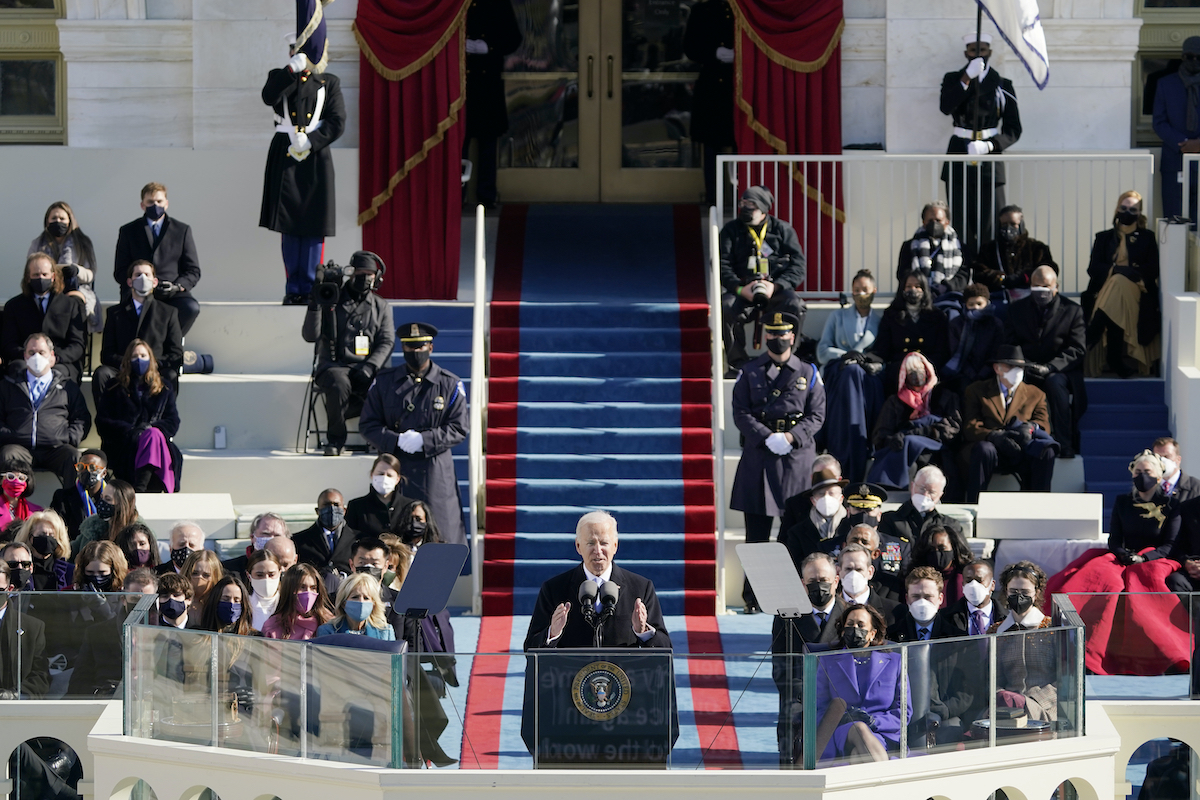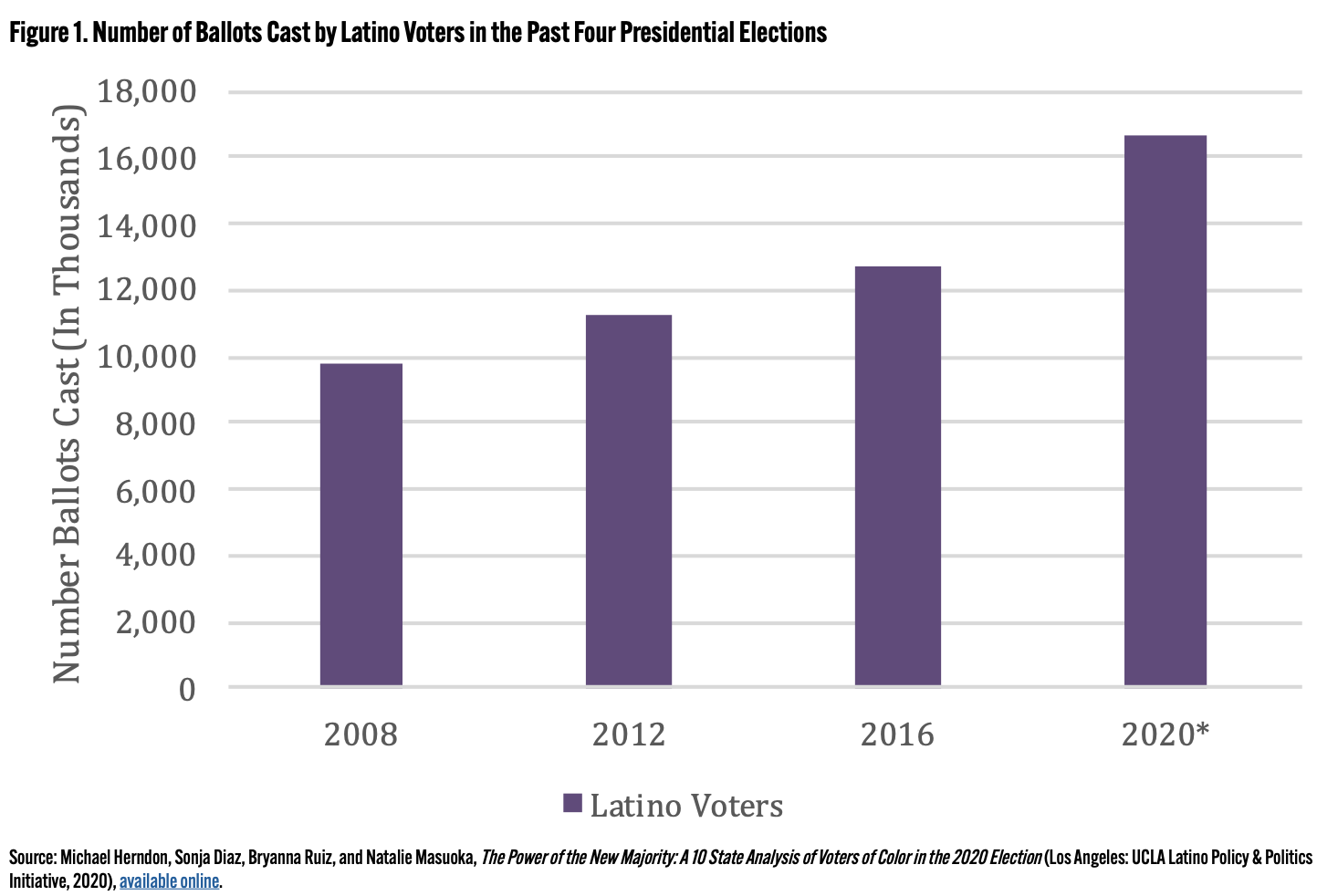

President Joe Biden speaks during the 59th Presidential Inauguration at the U.S. Capitol in Washington, Wednesday, January 20, 2021.(AP Photo/Patrick Semansky, Pool)
“Today we celebrate the triumph, not of a candidate, but of a cause, the cause of democracy. The people, the will of the people, has been heard, and the will of the people has been heeded.” —46th President of the United States of America Joseph R. Biden, January 20, 2021
The 2020 election was unusual on many fronts —a global pandemic, a President claiming voter fraud, attempted litigations in various states‚ just to name a few. Simultaneously, the base of Latinx people eligible to vote continued to increase, with a record 32 million projected, accounting for 13.3% of all eligible voters.
In 2016, about 12.65 million Latinx voters turned out to vote. In 2020, that number increased to an estimated 16.6 million, according to a new UCLA study published this week.
This increase was in thanks to the great organizers and mobilizers but also in reaction to the extreme rhetoric of the incumbent administration.
This election was not the landslide or Blue Wave that the Democratic Party was hoping for. The country remains increasingly divided evidenced through the insurrection at the U.S. Capitol. That division includes the Latinx community. As we have heard from various leaders and news outlets, the Latinx community is not a monolith group. In this election we saw this division play out by skin color, class, and geographic heritage. This election specifically highlighted the complex relationship the Latinx community has with Blackness and Indigenous roots.
But for things to change, we need to keep this momentum going. We need to cultivate a culture of voting not only in general elections but also in local elections and primaries. Organizations like Latina Vote and Voto Latino are doing a lot of work to get people registered to vote. But it’s up to us to hold our friends and families accountable for actually showing up to the polls and casting our votes.
In future elections, we should also focus on election counting efforts such as ballot “curing.” Ballot curing is essential in ensuring that all votes are counted. This is a process where volunteers reach out to mail in, absentee and provisional ballots that could be rejected for administrative reasons and provide assistance in how to ensure the ballot is accepted. This can also be done on your own by tracking your ballot. As we saw in this election, every single vote counts and can make a huge impact on the results.
Along with voting and election counting, we also need to participate in our local governments and show up for our school districts, our city councils, and our state governments. This election is a prime example of this. While we saw President Biden win, the Senate and House elections didn’t necessarily reflect the same wins Democrats thought they would see across the board. While it can feel overwhelming to pick up the phone and call your local elected official, there are various resources that can support activism at the local level.
With President Biden stepping into office, we need to hold him accountable as well. We cannot afford to fall asleep at the wheel again. It’s important to keep up with what is happening in the White House and ensure we are reading accurate information. A large part of what we saw in the 2016 and 2020 election was the use of misinformation and disinformation. Our family and friends may often be sharing memes and social media posts that are not true. And as we saw in the 2020 election, even our President can stand on a podium and provide false information. We need to stay informed and use reliable sources.
While this was an unusual election in so many ways, in others it was business as usual. It highlighted the racism, classism, and misogyny that has continued to exist in our country for hundreds of years. But it also showed the power that we have as a community to show up and show out for each other. While this new Presidency brings hope for a brighter future, it’s also a reminder of the power of our votes, voices, and community. We must continue to harness that power or else risk losing more than what we have already gained.
***
Sara Maldonado is the founder and Executive Director of Powerful Latinas Rising. She has been a lifelong advocate for the Latinx community and champion for Latina leadership and entrepreneurship. She holds a Bachelor of Arts in Liberal Arts from The New School and has earned a Master in Communication Management at the University of Southern California. Twitter: @PowerfulLatinas.



